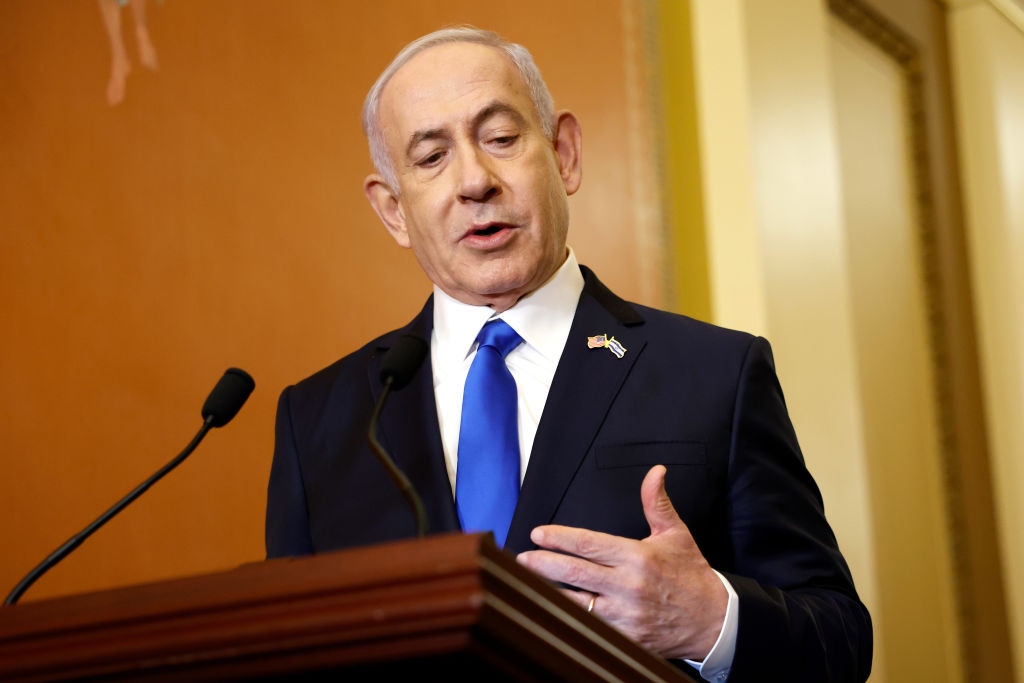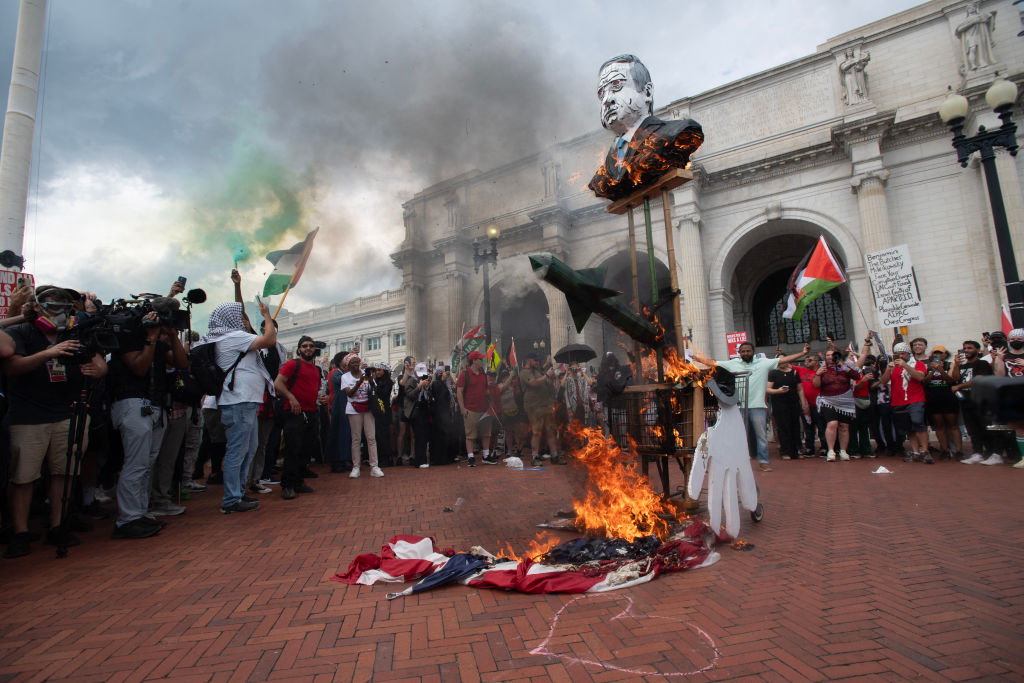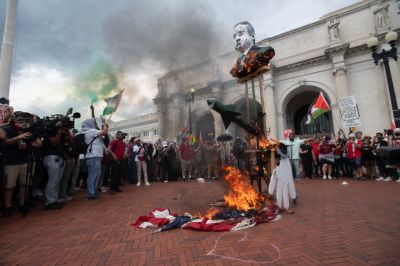Happy Thursday! The International Olympic Committee announced Wednesday that Salt Lake City, Utah, will host the 2034 Winter Olympics. If they’re looking for somebody to lead the planning committee, we happen to know of a Utahn with lots of experience organizing the Winter Olympics in Utah’s capital city who will have some free time come January.
Quick Hits: Today’s Top Stories
- President Joe Biden addressed the nation from the Oval Office on Wednesday night to discuss his decision to withdraw from the 2024 presidential race. “I revere this office. But I love my country more,” Biden said in the 11-minute remarks, his first since announcing his decision on Sunday. “You know, there is a time and a place for long years of experience in public life. There’s also a time and a place for new voices—fresh voices, yes, younger voices—and that time is now.” He framed the coming choice in November—almost assuredly between Donald Trump and his Vice President Kamala Harris—in existential terms, saying the country is at an “inflection point” that will “determine our fate of our nation and the world for decades to come.”
- Israeli Prime Minister Benjamin Netanyahu addressed a joint session of the U.S. Congress on Wednesday, emphasizing the importance of the U.S.-Israel relationship to win what he framed as a battle between “barbarism and civilizations” and the shared threat of Iran. During the remarks—which more than 100 congressional Democrats boycotted—Netanyahu offered his thanks to both President Joe Biden and former President Donald Trump. The Israeli leader plans to meet with Biden and Vice President Kamala Harris in separate meetings on Thursday, and then with Trump at his Mar-a-Lago home in Florida on Friday.
- U.S. Capitol Police on Tuesday arrested close to 200 people inside the Cannon House Office Building who were protesting U.S. arms sales to Israel. The protest, organized by Jewish Voice for Peace, previewed a much larger protest of Prime Minister Benjamin Netanyahu of Israel’s address to Congress, which saw several thousand protesters and rioters descend on Washington. Protesters gathered a few blocks from the Capitol holding signs calling for the arrest of Netanyahu, burning American flags and effigies of Netanyahu, spray painting statues and buildings, and chanting a variety of pro-Palestinian and anti-Israel slogans and antisemitic phrases. An additional six protesters were arrested inside the Capitol for disrupting Netanyahu’s address, while others who crossed the Capitol Police’s barricades were pepper sprayed.
- FBI Christopher Wray testified before the House Judiciary Committee on Wednesday at a hearing focused on the July 13 attempted assassination of former President Donald Trump in Butler, Pennsylvania. Wray revealed new details gleaned from the gunman’s electronic devices, home, and car, including that the shooter searched “how far away was Oswald from Kennedy” on July 6, a week before the attack. Wray also disclosed that the FBI recovered three explosive devices from the gunman’s car and home but that the trigger the gunman had on his person would not have caused the explosives in his car to detonate. Wray told the committee that the FBI recovered eight cartridges from spent bullets on the roof from which the gunman shot at Trump and confirmed that the shooter did use a drone to survey the location for the rally just hours before he conducted his attack.
- At least one North Korean balloon carrying trash landed in the South Korean presidential compound on Wednesday, though it’s not clear the compound was directly targeted, nor that North Korea would have the capacity to accurately strike a target in that way. Another balloon landed on a U.S. military base in South Korea on Wednesday as part of the launch that saw hundreds of balloons come across the border. South Korean security officials said the balloons did not contain hazardous materials and that no one was hurt in the incident. More than 3,000 such trash balloons from North Korea have fallen in the South since May as retaliation for ongoing efforts by South Koreans and North Korean defectors to send materials critical of North Korean dictator Kim Jong-Un and K-Pop songs north of the border using their own balloons.
- The Texas-based cybersecurity firm CrowdStrike—the company responsible for last week’s worldwide IT outage—announced Wednesday that a bug in an update was the source of the problem that crashed 8.5 million Microsoft Windows devices last Friday. Specifically, the bug was in its “Content Validator”—the system responsible for checking potential coding mistakes—which allowed the faulty code to roll out and be deployed onto devices around the globe. “This unexpected exception could not be gracefully handled, resulting in a Windows operating system crash,” CrowdStrike said in a statement. Meanwhile, Delta Air Lines CEO Ed Bastian issued an apology to customers on Wednesday for the flight cancellations and delays caused by the IT outage, and stated he expects the airline to be “fully recovered and operating” by Thursday.
- A federal judge in Pennsylvania on Tuesday ruled against several business groups who had sued to block the Federal Trade Commission (FTC)’s ban on non-compete agreements. Business groups quickly filed the lawsuit in April after the FTC commissioners voted 3-2 in favor of the rule. In her decision, Judge Kelley Brisbon Hodge, nominated by President Joe Biden, held that those suing the FTC failed to show how they were harmed by the non-compete ban, and that their argument—that the FTC’s decision is unconstitutional—is unlikely to “succeed on the merits.” The business groups that filed the case have yet to say whether they will appeal.
- Wildfires have raged across the Western United States this week—in Oregon, California, and Washington—causing thousands of people to evacuate as flames consumed nearly 100,000 acres in total. The largest fire in Oregon, the Durkee Fire, is 0 percent contained. Smoke from the wildfires prompted air quality alerts in many regions nearby—including parts of Colorado, Oregon, and Wyoming—and is expected to persist as the blazes continue.
‘A Clash Between Barbarism and Civilization’

WASHINGTON—In his historic address to a joint session of Congress on Wednesday afternoon, Israeli Prime Minister Benjamin Netanyahu preached a vision of U.S.-Israeli unity to a mostly friendly crowd.
Less than a mile away, down the hill at D.C.’s Union Station, anti-Netanyahu and anti-Israel protesters were wreaking havoc.
There, rioters burned Netanyahu in effigy, paraded down the street with a papier-mâché, 10-foot-tall puppet of President Joe Biden with bloody hands and devil horns, graffitied the statue at the center of Columbus Circle with the words “Hamas is comin,” waved the terrorist group’s flag, assaulted police officers, and pulled down the American flag on the pole outside the station and replaced it with the Palestinian flag.
As a crowd of protesters wrapped in keffiyehs—the piece of fabric that has come to symbolize the protests—looked on, chanting, “Burn that s—,” a man lit the American flag on fire. Onlookers shouted “Allahu Akbar” and cursed America while flames engulfed the flag.
Just minutes earlier—in one of the biggest applause lines for Republicans and most divisive moments for Democrats in his hour-long speech—Netanyahu had called such protesters the Iranian regime’s “useful idiots.” A White House spokesman condemned the flag burning and other activities at the protest—labeling such activities “disgraceful”—but the Harris campaign did not respond last night to TMD’s request for comment on the chaos.
Wednesday was a day of disorienting contrasts. A triumphant Netanyahu delivered an address that painted the U.S. and Israel as co-combatants in lockstep in a war against Iran—while more than 100 congressional Democrats and at least one Republican boycotted the speech and tens of thousands of protesters gathered outside and some burned him in effigy. And though Biden and Netanyahu are set to meet on Thursday, at this turbulent moment in American politics, Bibi will also meet separately with his potential future interlocutors: Vice President Kamala Harris and former President Donald Trump.
Back in May, House Speaker Mike Johnson, House Minority Leader Hakeem Jeffries, Senate Majority Leader Chuck Schumer, and Senate Minority Leader Mitch McConnell issued an invitation to Netanyahu to address a joint session of Congress after considerable behind-the-scenes wrangling. In March, Schumer had lambasted the Israeli leader from the floor of the Senate, calling on him to resign, though Schumer said in May that the U.S. support of Israel “transcends” disagreements with the Israeli government—though not enough for the two to shake hands on Wednesday.
Likewise, not all lawmakers were feeling transcendent. More than 100 House and Senate Democrats, including former House Speaker Nancy Pelosi, boycotted the speech—many to protest how Bibi has prosecuted his country’s war against Hamas. Other U.S. lawmakers criticized the speech as an effort to boost Netanyahu’s approval numbers back in Israel, where he and his government have faced months of protests. “For him, this is all about shoring up his support back home, which is one of the reasons I don’t want to attend,” Sen. Chris Van Hollen of Maryland told reporters. “I don’t want to be part of a political prop in this act of deception. He is not the great guardian of the U.S.-Israel relationship.”
It wasn’t only Democrats who decided to stay away. “Today Congress will undertake political theater on behalf of the State Department,” Rep. Thomas Massie of Kentucky, who advocates an isolationist foreign policy, tweeted Wednesday. “The purpose of having Netanyahu address Congress is to bolster his political standing in Israel and to quell int’l opposition to his war. I don’t feel like being a prop so I won’t be attending.”
Boycotts notwithstanding, the controversial Israeli leader made his fourth appearance before the U.S. Congress on Wednesday—the most of any world leader, including British Prime Minister Winston Churchill, who addressed Congress thrice during his tenure.
Bibi leaned into the soaring rhetoric Churchill was known for, framing Israel’s battle over the past nine months with Hamas—as well as with Hezbollah, the Houthis, and other Iranian proxy terrorist organizations—as part of a larger, more global fight. “In the Middle East, Iran’s axis of terror confronts America, Israel, and our Arab friends,” he said in the opening lines of the address. “This is not a clash of civilizations. It’s a clash between barbarism and civilization. It’s a clash between those who glorify death and those who sanctify life. For the forces of civilization to triumph, America and Israel must stand together. Because when we stand together, something very simple happens. We win. They lose.”
Netanyahu also spelled out what he fears would be the consequences of failing to back Israel in this contest with Iran. “For Iran, Israel is first, America is next,” he said. “My friends,
if you remember one thing, one thing from this speech, remember this: Our enemies are your enemies, our fight is your fight, and our victory will be your victory.”
Vice President Kamala Harris did not preside over the event as is typical for the veep, but instead attended what her newly minted presidential campaign said was a previously planned engagement with a black sorority in Indianapolis. Bibi nevertheless heaped praise on Biden for his support for Israel over the last several months and throughout his career, “and for being, as he says, a proud Zionist,” Netanyahu said. “Actually, he says, a proud Irish-American Zionist.”
But Netanyahu, perhaps mindful of the tenuous moment he landed in American politics, also thanked Trump for his administration’s actions—including moving the U.S. Embassy in Israel from Tel Aviv to Jerusalem and for brokering the Abraham Accords, which saw Israel normalize relations with Bahrain, the United Arab Emirates, and later Morocco.
Amid the praise, Bibi did offer some subtle rebukes of Congress and to critics—including those in the Biden administration—of how his country is conducting the war. In particular, he recalled the warnings about Israel’s invasion of Rafah, the southernmost city in Gaza that was one of Hamas’ final strongholds in the enclave. The Biden administration issued strenuous warnings about the invasion and publicly broke with Netanyahu’s government, calling a ground invasion of Rafah—where some 1.5 million civilians were thought to be sheltering—a “redline.”
“Remember what so many people said? ‘If Israel goes into Rafah, there’ll be thousands, maybe even tens of thousands of civilians killed,’” Netanyahu said. In the end, he claimed the number of civilians killed was “practically none,” though The Dispatch cannot independently verify that assertion.
He also seemed to scold Congress for its delay in passing the foreign aid packages earlier this year, name-dropping and paraphrasing Churchill explicitly. “Today, as Israel fights on the frontline of civilization, I too appeal to America,” he said. “Give us the tools faster, and we’ll finish the job faster.”
While Bibi emphasized his desire to destroy Hamas militarily—articulating his vision of a “demilitarized and deradicalized” post-war Gaza—a huge part of “finishing the job” is bringing the more than 100 remaining Hamas-held hostages home, including the five living and three dead Americans. Noa Argamani, the young woman who was one of four hostages rescued in a daring commando raid in June and who was an invited guest of the prime minister, received a standing ovation from the assembled lawmakers.
Netanyahu did not, however, mention the ceasefire-for-hostages deal Biden proposed in May, which U.S. officials have reportedly been negotiating in Qatar in recent weeks. Biden is reportedly planning to press Netanyahu on the deal during their meeting today, and discuss how to “close the gaps” in Israel’s plans to implement the three-phased deal that could see a temporary ceasefire become permanent, contingent on the exchange of hostages for Palestinian prisoners—many of whom are guilty of terrorism and other crimes—tried and held in Israel.
That Netanyahu was mum on the proposed deal isn’t necessarily surprising. “There’s several possible reasons why he would not have featured [it] more prominently in his speech, and one would be that maybe a deal is pending and he didn’t want to mess it up,” said Bradley Bowman, a former Army officer and Senate staffer who serves as a senior director of the Center on Military and Political Power at the Foundation for Defense of Democracies. “It might be that he’s balancing a coalition on the right, where some would be reluctant to have any sort of ceasefire until Hamas is more decimated than it is. And it might be that he felt like some of those messages—because of some of the nuance I’m describing—would be better delivered in private.”
Capitol Police arrested several protesters who removed their top layer of clothing during the speech to reveal bright yellow “Save the Deal” T-shirts, advocating for an agreement to return the hostages. One man was allowed to remain in the balcony of the House chamber once he buttoned up his shirt again.
Though members of Congress in attendance certainly let their opinions be known about the Israeli leader’s speech after the fact, others didn’t wait quite so long. Progressive Rep. Rashida Tlaib of Michigan has criticized Netanyahu and the war to the point of being censured in November by her House colleagues for “dangerously promoting false narratives regarding a brutal, large-scale terrorist attack” that took place on October 7. She wore a keffiyeh and held up a circular placard that read “war criminal” on one side and “guilty of genocide” on the other. Democratic Rep. Jake Auchincloss of Massachusetts, who had been seated by her for much of Netanyahu’s remarks, switched seats after she raised her placard.
The speech, which was met with frequently uproarious applause from Republican lawmakers, inspired dramatic and vitriolic statements from Democrats—especially those who boycotted.
“Benjamin Netanyahu’s presentation in the House Chamber today was by far the worst presentation of any foreign dignitary invited and honored with the privilege of addressing the Congress of the United States,” Pelosi tweeted. “These families are asking for a ceasefire deal that will bring the hostages home—and we hope the Prime Minister would spend his time achieving that goal.”
Democratic Sen. Chris Murphy of Connecticut was likewise disdainful. “That speech was, as I expected, a setback for both the U.S.-Israel relationship and the fight against Hamas,” he said. “It was a speech designed to bolster Netanyahu’s political standing and U.S. Republican messaging.”
But some Democrats viewed the speech as a success, including Sen. John Fetterman of Pennsylvania, a strong supporter of Israel who wore a suit for the occasion instead of his typical hoodie and shorts. He and Sen. Joe Manchin of West Virginia, now an independent, were the only two non-Republican lawmakers who stayed behind after the speech to shake Netanyahu’s hand.

Meanwhile, outside, protests raged near Union Station. As the American flag lay on the ground outside the train station in a smoldering heap, at least two men tried to save it. One passerby made his way to the middle of the circle and beat the fire with his jacket before he was forced back by protesters. Another reached for a piece of the still-burning flag and ran, as protesters—including a young woman who grabbed a chunk of it that trailed behind him—chased after him.
Later Wednesday afternoon, as the crowds were beginning to disperse in Columbus Circle, one of your Morning Dispatchers saw a young woman carrying a melted flag. She showed it off, holding it up like a prize. Where did she get it?
“I chased a man that tried to steal it,” she said.
Worth Your Time
- As protesters once again descended on Washington for Netanyahu’s address to Congress, Marc Fisher remembered another time when destructive protests roiled the nation’s capital—in 1968. In an article for the Washington Post, he remembers Larry Rosen, who owned Smith’s Pharmacy on 14th Street until it was burned down in a riot. “The city’s population plummeted by 17 percent in the 20 years after the riots,” Fisher wrote. “You’d hardly know it given today’s boulevard of pricey restaurants and multimillion-dollar condos, but the empty spaces on 14th Street lingered for decades, symbols of a lost community. …‘I’ve been told many times by friends that I should forget that day,’ [Rosen] once told me, ‘but I find it hard to do.’ That year—like this one threatens to be—was a moment when the American center did not hold, when the foundation cracked in ways that still threaten the stability of our common home. We tend to remember that year as a furnace of conflict and division, as well as a moment of innovation and cultural ferment. But Larry insisted we also remember it as personal trauma, a smoldering violation of our basic social compact. The scar of ’68 is still raw today.”
- For his Governing Right Substack, Andy Smarick wondered whether we’re ever going to talk about policy again. “Polarization has convinced many voters that the particulars of governing don’t matter so much,” he wrote. “What matters is that the other party’s choice not win. Discussions about governing become superfluous. As a result, I’m not sure—even though this is his third time heading the GOP ticket—what [former President Donald] Trump thinks of federalism or civil society. I don’t know whether he believes in deficit reduction. I’m not sure how he’d pick judges were he re-elected. I don’t know what he thinks about criminal justice reform or a host of family policies. And now it appears that [Vice President Kamala] Harris will become her party’s nominee without any discussion of the budget, China, crime, child tax credits, free speech, immigration, K-12 education, student-loan forgiveness, taxes, workforce participation rates, or anything else.”
Presented Without Comment
Washington Post: Maggots, Crickets Released at Watergate Hotel in Protest of Netanyahu Visit
Also Presented Without Comment
BBC: Sharks Off Brazil Coast Test Positive for Cocaine
In the Zeitgeist
“Come gather ‘round people.” Timothée Chalamet will portray folk rock artist Bob Dylan in the upcoming film A Complete Unknown. The trailer for the film—scheduled to hit theaters in December—gives us the first look at Chalamet’s Dylan, and we have to say, he has the slouch down.
Toeing the Company Line
- In the newsletters: The Dispatch Politics team reported on the newfound enthusiasm for Vice President Kamala Harris within the Democratic Party, Scott explained why (🔒) the political volatility of the past few weeks hasn’t led to much market volatility, Jonah argued (🔒) that media organizations aren’t supposed to carry water for political parties, and Nick gamed out (🔒) what a potential Kamala Harris administration might look like.
- On the podcasts: Steve joins Jonah on The Remnant for some non-emergency rank punditry, and Sarah and David are joined on Advisory Opinions by Notre Dame professor Derek Muller to discuss the legal ins and outs of the Biden-Harris switcheroo.
- On the site: Drucker checks in on Kamala Harris’ chances with Jewish voters.
Let Us Know
Did you watch Netanyahu’s remarks yesterday? What did you make of his message—and U.S. lawmakers’ response to it?







Please note that we at The Dispatch hold ourselves, our work, and our commenters to a higher standard than other places on the internet. We welcome comments that foster genuine debate or discussion—including comments critical of us or our work—but responses that include ad hominem attacks on fellow Dispatch members or are intended to stoke fear and anger may be moderated.
With your membership, you only have the ability to comment on The Morning Dispatch articles. Consider upgrading to join the conversation everywhere.